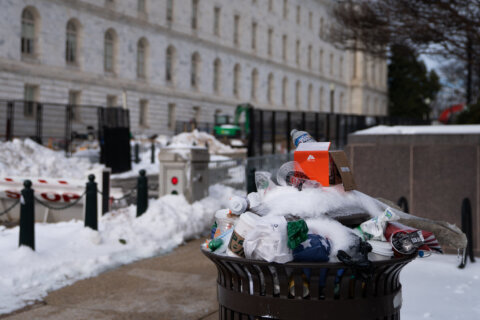
The District has a sweeping shortage of quality child care centers — and once parents do find a spot for their infants and toddlers, enrollment often comes with a hefty price tag. That dilemma is causing some parents to rethink living in D.C.
A new survey by nonprofit Under 3 DC — a group that pushes for D.C. to spend more to subsidize care for infants and toddlers — found that 57% of responding parents said the dearth and cost of early education would affect their ability to continue living in the District.
“It’s priced like a luxury good,” said Danielle Geong, who lives in Northeast.
Geong said she began searching for a preschool for her daughter, Lily, when she was five months pregnant. The family was wait-listed several times, with Lily moving to at least four child care centers.
“That just tells you about the scarcity of child care,” Geong said. “Everyone needs infant care right now and there’s just not enough. When you get a good care provider, you can never let them go.”
Lily is now two years old and has a spot at a high-quality preschool center in D.C. But Geong and her husband, Adam Pimentel, said they pay over $1,900 a month — a blistering price tag for the family, supported only by Pimentel’s salary while Geong, an information technology consultant, searches for a full-time position.
“It costs about half of our discretionary income,” Geong told WTOP. “I’m not sure how long we can afford this kind of arrangement.”
Geong’s struggle is common among parents in D.C., according to Clive Belfield, a professor of economics at Queens College in New York, who worked on the survey.
Parents surveyed said the dearth of child care and the soaring costs have impacted their careers and earning potential. For example, the survey found:
- 52% of parents said they had to reduce regular work hours
- 46% of parents said they had to decline an opportunity to pursue more education or training
- 36% of parents reported turning down promotions
- 28% of parents said they had to quit a job, and
- 21% of parents said they were demoted or transferred to a less desirable position
Those consequences compound to less productivity for workers and a greater loss of revenue for businesses and the city, according to Belfield.
“Parents understand that when your children are young, you’re going to have to juggle,” Belfield said. “But most parents, based on their responses and the amount of money they’re losing, were shocked to learn how many ways it impacts their careers.”
‘You want to live somewhere that has your back’
The District is in the middle of a child care crisis. As of 2022, there were roughly two infants and toddlers living in D.C. for each licensed early learning slot available, according to Under 3 DC. The group said cities across the U.S. are experiencing similar situations, citing a series of articles by the Washington Post.
But Belfield said in some areas, including The District, the situation is worse because rents for families and preschool centers are higher: “If we’re talking about thousands of dollars a year, parents are going to make decisions on where to live based on the availability of child care.”
“They’re increasingly doing that, and cities are slowly realizing that these amenities are what families need to stay,” Belfield added.
Geong and Pimentel bought a house in D.C. before their daughter was born. Geong said she and her husband factored in the costs of early education and have no plans to move, because child care is expensive in the suburbs, too.
But she wishes The District offered some type of financial assistance: “You have to navigate all of these things,” she said. “You kind of want to live somewhere that has your back, that thinks families and kids are important and not just for wealthy folks.”
Get breaking news and daily headlines delivered to your email inbox by signing up here.
© 2024 WTOP. All Rights Reserved. This website is not intended for users located within the European Economic Area.









